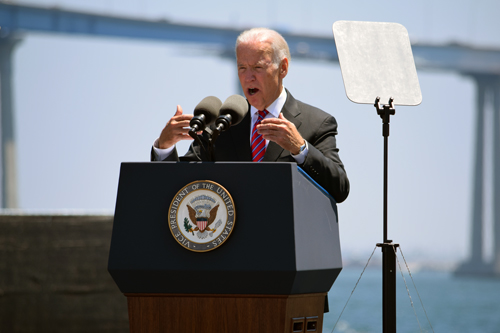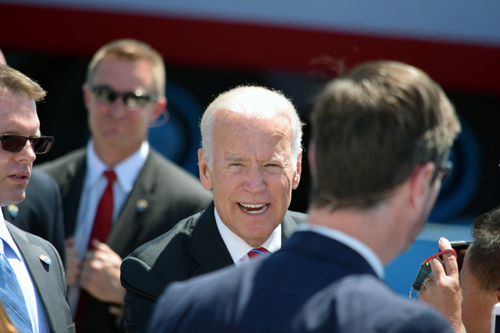
Story by Donald H. Harrison; Photos by Shor M. Masori



SAN DIEGO – In a strongly worded speech, U.S. Vice President Joe Biden on Wednesday warned foreign competitors that if they overtax U.S.-bound goods, or sell their products at a loss in the United States to drive down American competition, the U.S. government will file suit against them at the World Trade Organization and press for compensation.
The vice president made his half-hour speech at the 10th Street Terminal of the Port of San Diego, where automobiles are imported from Asia and fruit is offloaded from Latin America. His lectern was positioned so that the bay and the San Diego-Coronado Bay Bridge were positioned behind him. His audience included employees of the port and local maritime businesses, the U.S. Navy, the Teamsters and government representatives of the five cities that make up the San Diego Unified Port District: San Diego, Imperial Beach, Coronado, Chula Vista and National City.
Prefacing his remarks by saying he was a strong union man and a member of the Middle Class who knows how important good-paying jobs are to Americans, the vice president said that the Obama administration has been filing unfair trade complaints with the WTO and would aggressively file more, mentioning one against China for adding a 20 percent export tax on such raw materials as graphite, which is important in the manufacture of refrigerators and batteries, among other uses.
Similarly, he said, tin and copper are also unfairly subjected to a Chinese export tax, making the cost of American products that utilize these metals more expensive than they should be. Reducing the cost of raw materials to a reasonable amount, he said, would enable local cellular technology company, Qualcomm, which uses tin in its manufacture of semi-conductors, more competitive in the global marketplace.
The vice president rattled off a number of American industries that are handicapped by unfair export taxes levied by China, among them the automobile and electronics industries, and even those producing fertilizer and animal feed.
Warming to his subject—which helps position the Obama administration as tougher on trade than Donald Trump and Bernie Sanders have been saying, and which may put pressure on Hillary Clinton to back off from opposition to the pending Trans-Pacific Partnership agreement—Biden also said that China put a “$5 billion illegal tax” on cars being shipped from the United States to China, a levy that has the effect of taking away American jobs.
On the topic of automobile workers, the Vice President noted that he had been a strong advocate for the financial bailout of the American car-making industry. He said the bailout saved the jobs of 926,000 American workers, and that critics of his advocacy can “go to hell.” Some audience members were shocked by his bluntness, others applauded.

While China was the vice president’s main focus, he noted that the United States has won WTO cases against Argentina, India, Columbia, Honduras and South Africa in the past. “We are demanding other countries live up to the agreements,” he said. “This is about American jobs. We will continue to be aggressive.”
Last year, Biden said, the United States initiated 62 cases against countries “we believe are violating the law.” And prior to that, he said, the U.S. was able to win penalties totaling $1.2 billion from nearly 40 countries who violated fair trade agreements.
His warning to other countries: “don’t stack the deck!”
Why does the United States want trade agreements with foreign buyers, he asked rhetorically. Ninety-five percent of the world’s consumers live outside American borders, he answered.
*
Harrison is editor and Masori is a staff photographer of San Diego Jewish World. Their emails are donald.harrison@sdjewishworld.com and shor.masori@sdjewishworld.com, Comments intended for publication in the space below MUST be accompanied by the letter writer’s first and last name and by his/ her city and state of residence (city and country for those outside the United States.)